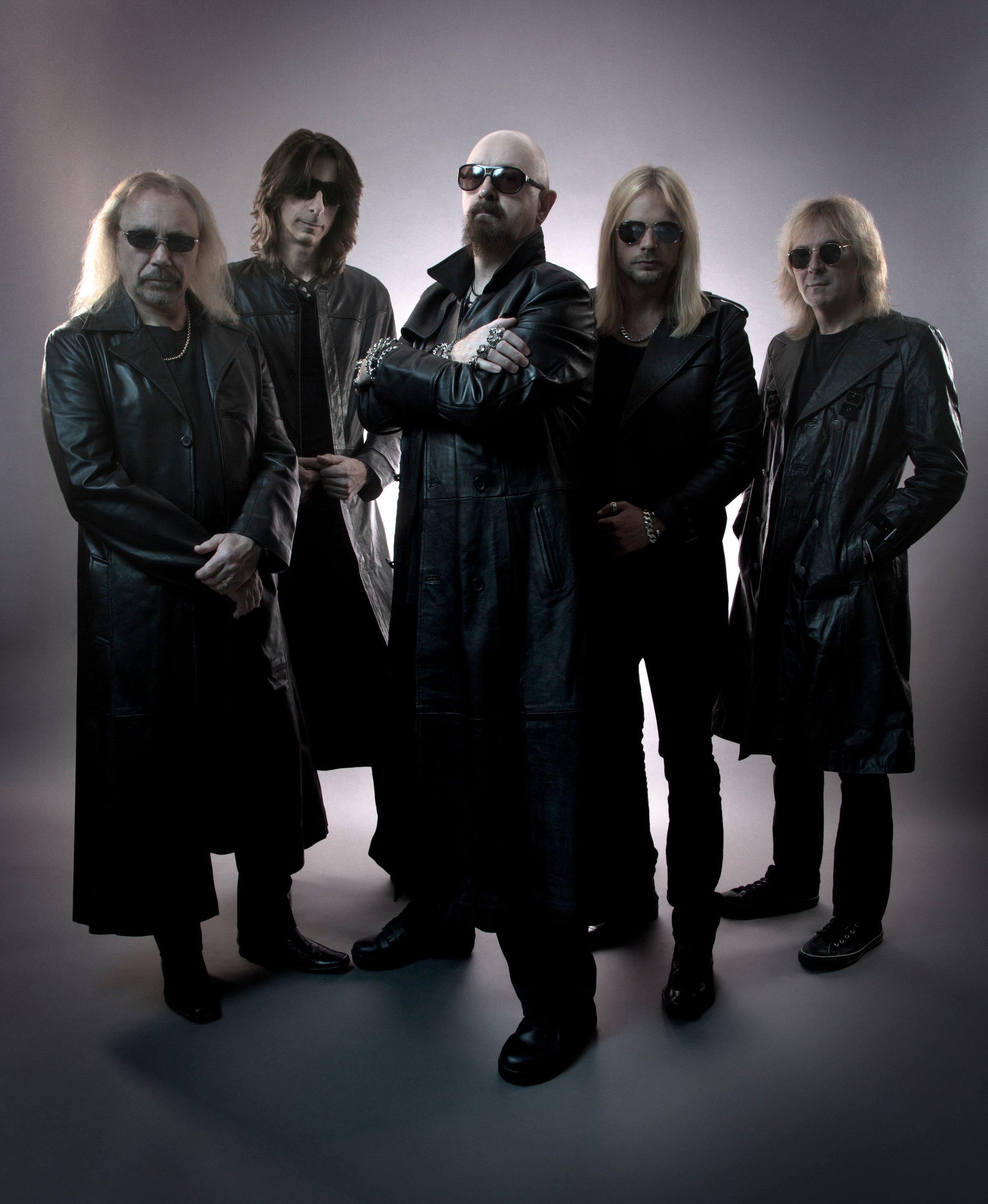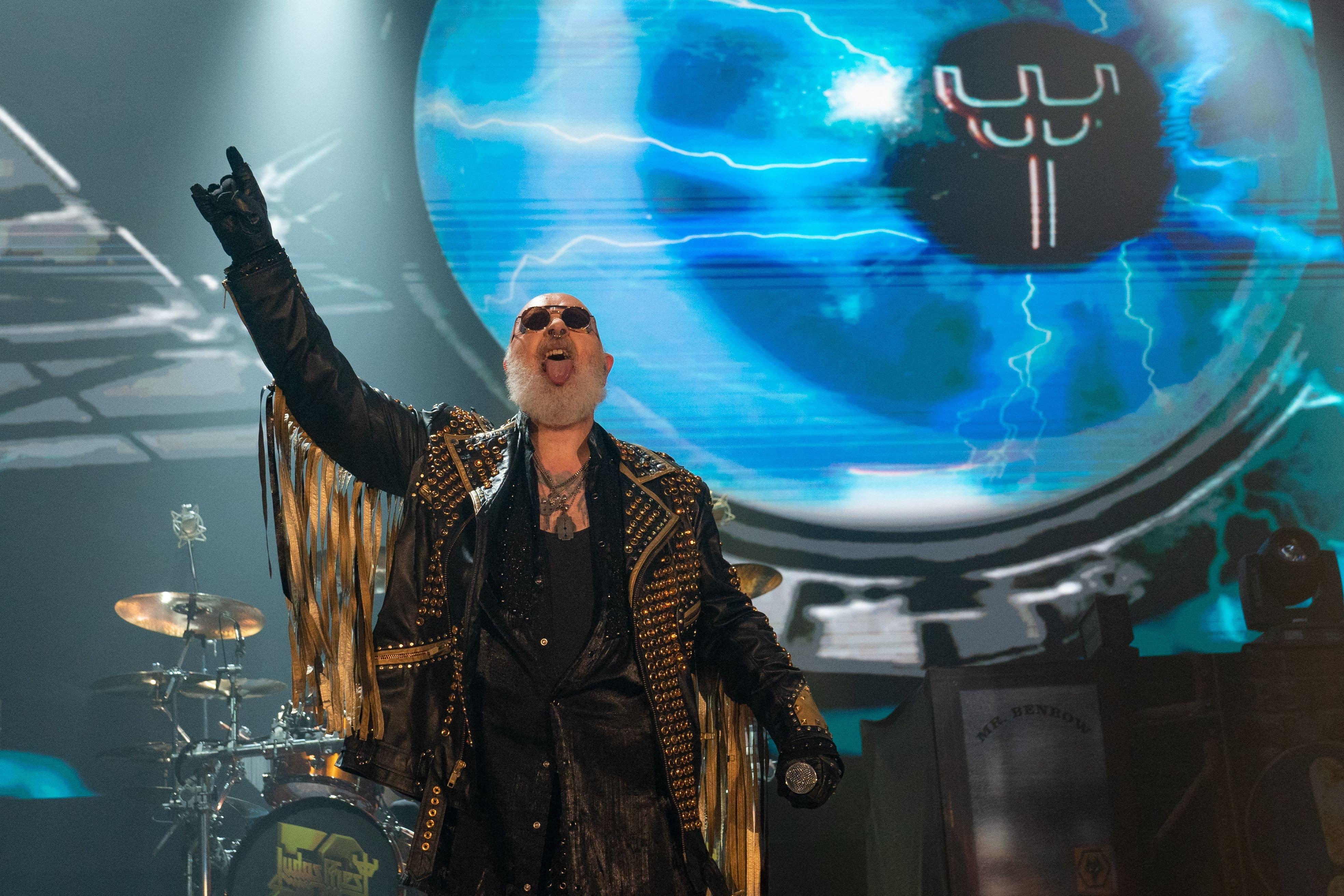On July 8 GRAMMY-winning metal legends Judas Priest will return with Redeemer Of Souls, their 17th studio album and first in six years. In contrast to the British quintet's all-encompassing 2008 metal opera Nostradamus, their latest offering roars back with a rawer, heavier collection of anthems, ballads and epic rockers that strongly tap into the melodic aggression that has characterized the band's diverse output for the past 40 years. And listening to the turbo-charged songs on Redeemer Of Souls, it's clear that their passion and enthusiasm remain strong.
On Oct. 1 Judas Priest will launch a U.S. tour in support of the album, with dates scheduled through November. Contrary to some reports, their 2011 farewell tour was not the end of their live performance endeavors, but marked the end of extensive world touring for the band.
Ahead of the album's release, frontman Rob Halford and guitarists Glenn Tipton and Richie Faulkner participated in an exclusive GRAMMY.com interview to discuss the new album, bringing Faulkner into the fold and the possibility of Priest on Broadway.
The new album has a very yin and yang feel to it, with half of the songs being stripped down and the other half sounding more epic. Was that intentional?
Faulkner: I think the only thing that was intentional was to do what the band does and has been doing for 40 years, which is not have any sort of concept or rules. And if it sounds good, we'll go with it, [whether] it's an epic-sounding song or a straightforward song.
This is Richie Faulkner's first album with Judas Priest. What was the songwriting dynamic like this time?
Halford: It's different but it's the same in the respect that it's always been two guitar players and a singer pitching in together. There's no doubt that Richie's input has been incredibly energizing. Just to have a different perspective from Richie's ability as a guitar player [as] well as a songwriter did bring some very unique and exciting moments to the writing sessions.
Tipton: It was great. Richie was thrown in the deep end. The first show he did was "American Idol" [in 2011 in front of] 30 million people, then we went to a massive festival in Europe, so he had a lot of challenges initially on the live side of things. He came through with flying colors, but we never knew how [the] writing was going to work out. And it was like we've always been together. It was just a very natural thing. … He's put his own stamp on [the music]. That's the remarkable thing.
There are obviously the requisite Judas Priest fantasy lyrics on Redeemer …, but I'm very intrigued by "Cold Blooded" and "Crossfire." The former kind of makes me think of a serial killer, and I'm curious what inspired that?
Halford: Glenn is responsible for the vast majority of lyrics on that song.
Tipton: It was a sinister subject — just cold blood that runs through me. Someone who's been beaten, battered, been through the mill, couldn't have had worse things happen. They've lost all feeling. It's a sinister thing that lends itself to a metal song.
Did it make you think back to Birmingham, England, where you grew up?
Halford: Oh yeah. That's what I loved when I was noodling with the lyrics that Glenn put down. It's about isolation and it's about [how] you cannot connect to people. It has that angst in it, so I think from a metalhead's perspective, when they are listening to this track, they might [say,] "That used to be me," or "that's me now" or "I know somebody [who's] had that type of experience." That's the wonderful thing with nearly everything Priest [have] made over the years, the ability for our fans to feel as though we're touching them with the messages we have inside us.
The lyrics on "Crossfire" take on religion. Where did that come from?
Halford: Again, you look through the history of Priest with songs like "Savage" from [1978's] Stained Class, where we talked about climate change before there was even climate change. "Electric Eye" [from 1982's Screaming For Vengeance] is about spy satellites. We've always had a great sense of adventure lyrically to blend reality and fantasy, so that's just a little dig at the way that all religion is supposed to preach love, peace and whatever, but there are extremists [who] just go out there and f*** it all up.
"Never Forget" is a thank you to the fans, but it also sounds like goodbye. Is it goodbye?
Halford: No, it's not. We've done that before with "United" [from 1980's British Steel] and tracks where we've talked about that special bond that not only Priest [have], but all metal bands have with the fans [who] support them, and we just wanted to go a little deeper in sentiment with this song. … We'll play until the end.
Rob, you've mentioned carrying around a Roget's Thesaurus to come up with new words for songs. Are there any words that you have been trying to get into a Judas Priest song that you haven't yet?
Tipton: Supercalifragilisticexpialidocious.
Halford: Could you imagine? [Halford repeats the word in death metal growls.]
I was thinking of that.
Halford: I've never said "crescent moon" before. [I] just [incorporated] a simple crescent moon in "Secrets Of The Dead" [on Redeemer Of Souls]. Much like Richie and Glenn are trying to find new riffs and notes, and bend the guitar strings [like] they've never done before, that's what I try to do as a lyricist. There are some staple words in metal that you have to use because there's nothing else that has the same value. You've got to say "pain," you've got to say "fear," because there is no comparative word that carries the same essence of message. Beyond that, I work really hard to try to pick words, ideas and phrases to bring something different and interesting.
How are you feeling lately, Rob? I recall you were in a wheelchair last year when you were promoting the live Epitaph DVD.
Halford: It was a bit of a glitch. I had a back operation. It's fixed. I'm still not 1,000 percent, but I don't think I ever will be, quite frankly. At this point, who is? I went under the knife screaming in pain and woke up pain-free. I think whenever you're dealing with physical challenges, it really sorts out your personality and what you want out of life. I just wanted to get back to my job as a singer in a metal band as quickly as possible.
Have you ever considered doing Broadway?
Halford: As musicians, it's really cool to contemplate every possibility, but again you have to be careful. We're so grateful for the treasures that we've got in Judas Priest and we understand the ramifications of going too far, too left field. That can lead to some negative response. First and foremost, I think for all of us, everything that's embodied in Judas Priest is how we want to represent ourselves. Probably as [we] move on in [our careers], [we] can take more steps into different rooms, so to speak. It's the timing. … I'd love to see Nostradamus on Broadway.
Tipton: With [co-manager] Bill [Curbishley's] connections in the movie and theatrical world, we actually wrote [Nostradamus] with the hopes that at some point either we could perform it on Broadway or it could be orchestrated. I think it's a great soundtrack and a great scene for a Broadway production.
(Bryan Reesman is a New York-based freelance writer.)





